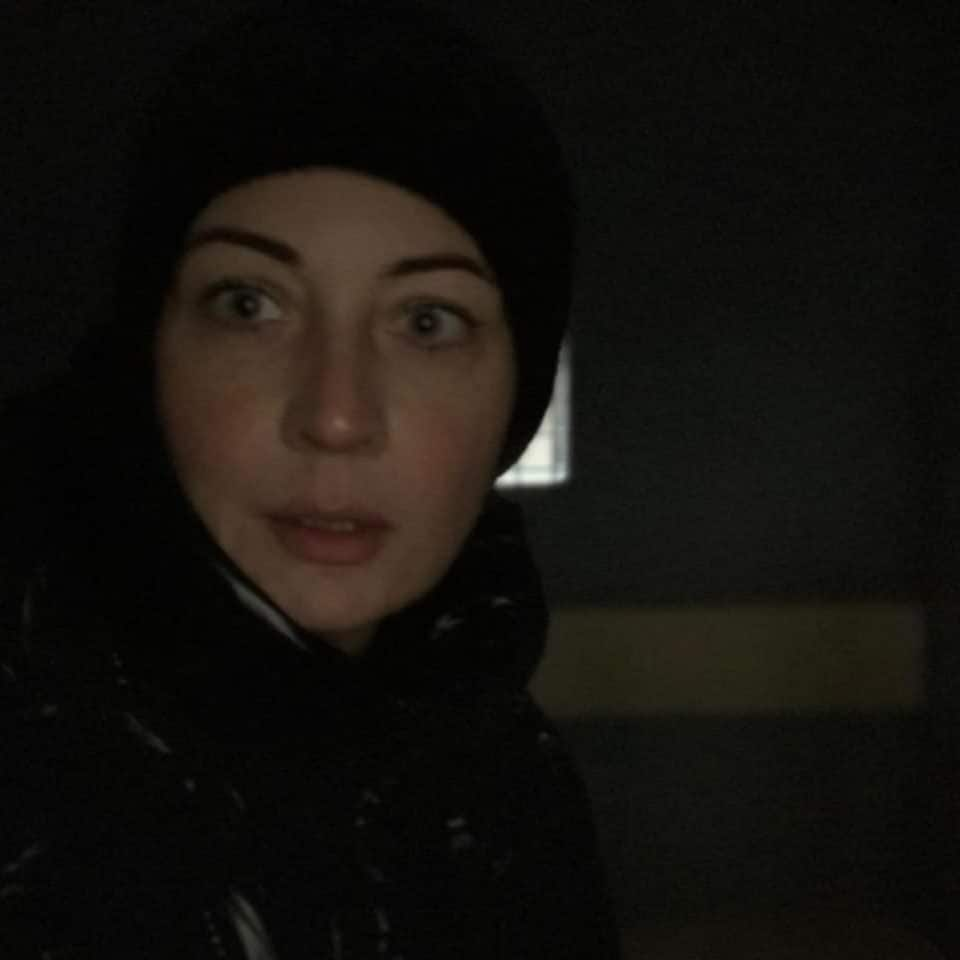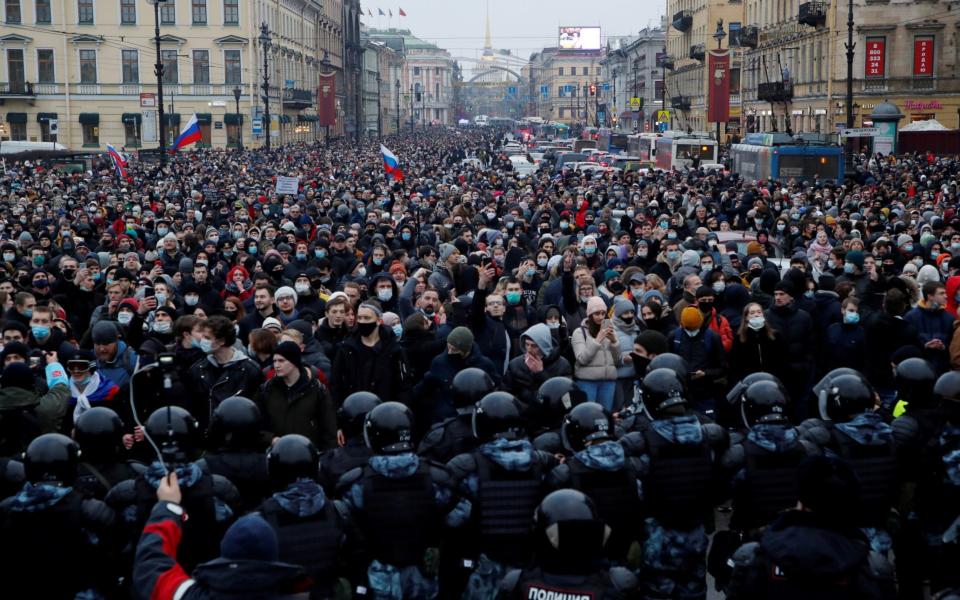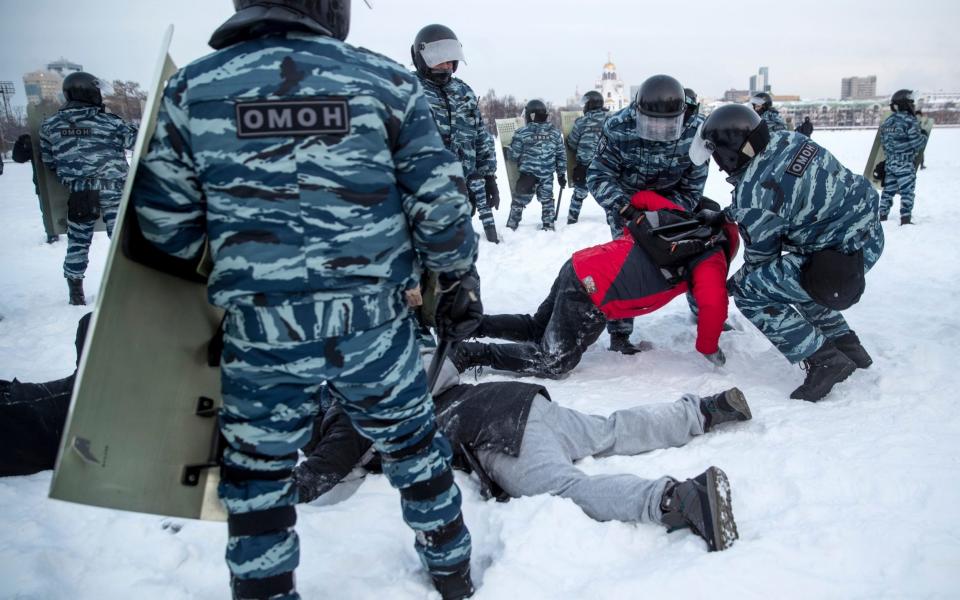Navalny's wife detained amid mass arrests as protests sweep across Russia

- Oops!Something went wrong.Please try again later.
Russian police detained Yulia Navalnaya, the wife of jailed Kremlin critic Alexei Navalny, at a protest in Moscow on Saturday as demonstrations in support of the opposition leader swept across Russia.
Authorities detained at least 1,600 people at unauthorised rallies in Moscow and dozens of cities across the country, with some reports of violent clashes between protesters and riot police.
At least 10,000 people joined protests in Moscow, according to estimates, in a test to Vladimir Putin.
Protests began in Russia’s Far East and Siberia on Saturday morning. Seven time zones east of Moscow, about 3,000 people marched across the city of Vladivostok on the Pacific Ocean, chanting “Navalny!”
In Novosibirsk, chants “Putin is a thief” rang out in freezing minus 19 C temperatures as opposition supporters walked across the city to the main square.

Riot police were deployed to most of the protesting cities, with local media reporting violent detentions in Vladivostok and Khabarovsk.
OVD-Info, a citizen project that collects information on protesters’ detentions, reported over 863 arrests across Russia by Saturday afternoon.
The protests were triggered by the arrest of Mr Navalny who returned to Russia last Sunday for the first time since he was poisoned and airlifted to Germany for treatment.

Russia never launched a probe into the attack on the politician while several independent European laboratories confirmed that he was poisoned by the Soviet-era Novichok nerve agent.
Rallies on Saturday went ahead despite mounting pressure from the authorities and the police who arrested several key Navalny allies earlier this week and threatened protesters with rioting charges.
Investigators also promised to press charges against Mr Navalny’s team for allegedly involving minors in demonstrations after the call for protests became viral on TikTok, a social network popular with younger Russians.
Protest crowds on Saturday, however, mostly appeared to be middle-aged. Mr Navalny, who has been a thorn in the Kremlin’s side for years, kept embarrassing the Kremlin while convalescing, first by joining an investigation by independent investigative group Bellingcat that exposed Russian intelligence agents behind the poisoning, and then by prank-calling one of the agents and getting him to detail the operation to kill him.
The Kremlin issued repeated warnings for Mr Navalny not to come back to Russia, threatening him with charges that are sure to lock him up for years.
Vladimir Ashurkov, Mr Navalny’s close ally who fled to the UK in 2014 when faced with criminal prosecution, told the Telegraph that Mr Navalny “has been taking risks fully aware of all the opportunities and possible fallout.”
Mr Navalny’s arrest at a hastily arranged court session on Monday “has enraged many people who did not speak up about politics before,” according to Mr Ashurkov.

Several dozen celebrities earlier this week came out in Mr Navalny’s support ahead of the planned rallies including several top athletes such as a former national football team captain.
Adding more fuel to the fire, Mr Navalny’s team put out his investigation into President Vladimir Putin’s alleged wealth the day after he was arrested.
Revelations about Mr Putin’s wealth in the YouTube video that got a staggering 65 million views, however, were hardly a surprise for most Russians who are used to living in a country ruled by a corrupt elite.
“They already knew that powers-that-be, from Putin downwards, don’t govern in the interest of people,” Dr Sam Greene, head of the Russia Institute at King’s College London, told the Telegraph.
“The goal for the opposition now is not to convince Russians that Putin is corrupt but to convince them that a change of power can change things.”
